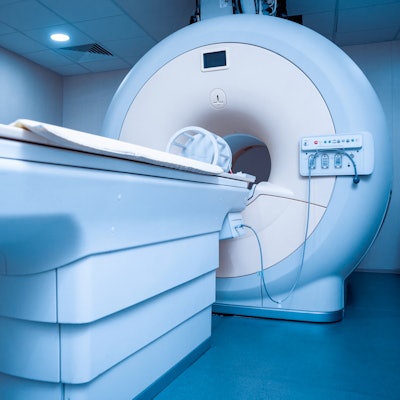
A new study published August 2 in Abdominal Radiology found that patients undergoing MRI scans who weren't native English speakers had more difficulty following breathing instructions. This could affect the efficiency of MRI services.
Researchers analyzed a number of factors that affected scan times at their academic institution, finding that the ability to follow breathing instructions had the biggest impact on scan times. And of the patients who had trouble following instructions, almost twice as many were not native English speakers, according to a team led by Dr. Paul Smereka of NYU Langone Health.
The authors noted that healthcare reform, changes in reimbursement, and higher demand for cross-sectional medical imaging have put more pressure on radiology departments to operate more efficiently. In radiology's most powerful modality, MRI, scan times can vary greatly depending on the type of body part being imaged and the sequences being used. Therefore, there is both a need and an opportunity to streamline MRI operations.
While many previous studies have addressed MRI operational efficiency, Smereka et al saw an opportunity to examine preexisting patient characteristics that might make it possible to predict how long a scan might take. They examined contrast-enhanced liver MRI scans that were conducted on 1.5-tesla and 3-tesla scanners at an outpatient facility from January to April 2019.
They ended up with a patient cohort of 222 individuals that included 90 women and 132 men, with an average age of 69. They then reviewed the electronic medical records for the patients to analyze demographics such as age, sex, body mass index higher than 30, first language not English, need for an English translator, and hearing or vision problems, among other characteristics.
MRI scan times were then calculated, with Smereka et al finding a median scan time of 18.9 minutes for the entire patient population. The number was higher for those with difficulty following breathing instructions; of this group, nearly twice as many were nonnative English speakers.
| Patient characteristics affecting MRI scan times | |
| Patient characteristic | Median scan time |
| All patients | 18.9 minutes |
| Patients with breathing compliance issues | 23.98 minutes |
| Patients without breathing compliance issues | 17.5 minutes |
| Patients with difficulty following breathing instructions | |
| Patient characteristic | Percentage of patients |
| Nonnative English speakers | 53% |
| Native English speakers | 27% |
| Patients requiring a translator | 35% |
| Patients not requiring a translator | 13% |
The researchers noted that no other differences in patient characteristics between those with breathing compliance issues and those without achieved statistical significance.
In analyzing the data, Smereka et al said that not only could their study's findings help MRI sites anticipate how long scans will take, but they also provide the opportunity for better training of MRI technologists and translators who take care of nonnative English speakers who may need a scan.
"These data illustrate the potential to improve scanner efficiency by more accurately predicting the length of MRI scans," the authors concluded. "Better delivery of instructions in patients' native or preferred language prior to scanning could be one potential solution to improve scanner efficiency and patient care."



















